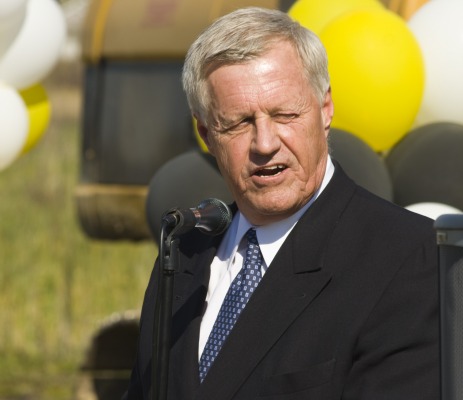 Flip flop much?Photo: lincolnbluesRemember how we told you the other day that Newsweek columnist George Will thinks high-speed rail is a sinister progressive plot to undermine American individualism?
Flip flop much?Photo: lincolnbluesRemember how we told you the other day that Newsweek columnist George Will thinks high-speed rail is a sinister progressive plot to undermine American individualism?
Well, big thanks to reader Ed D’Amato, who tipped us off to something very interesting from Mr. Will’s archives. Because apparently, that wasn’t always his opinion.
In the dark days immediately after 9/11, Will seems to have had a revelation about how a certain mode of transportation could help our nation be stronger and more secure. In an Oct. 1, 2001 column syndicated in the Jewish World Review, Will recommended three steps in response to the attack that the nation had just sustained. First, buy more B-2 bombers. Second, cut corporate taxes. And third? Let Will speak for himself (emphasis mine):
Third, build high-speed rail service.
Two months ago this columnist wrote: “A government study concludes that for trips of 500 miles or less — a majority of flights; 40 percent are of 300 miles or less — automotive travel is as fast or faster than air travel, door to door. Columnist Robert Kuttner sensibly says that fact strengthens the case for high-speed trains. If such trains replaced air shuttles in the Boston-New York-Washington corridor, Kuttner says that would free about 60 takeoff and landing slots per hour.”
Thinning air traffic in the Boston-New York-Washington air corridor has acquired new urgency. Read Malcolm Gladwell’s New Yorker essay on the deadly dialectic between the technological advances in making air travel safer and the adaptations to these advances by terrorists.
“Airport-security measures,” writes Gladwell, “have simply chased out the amateurs and left the clever and the audacious.” This is why, although the number of terrorist attacks has been falling for many years, fatalities from hijackings and bombings have increased. As an Israeli terrorism expert says, “the history of attacks on commercial aviation reveals that new terrorist methods of attack have virtually never been foreseen by security authorities.”
The lesson to be learned is not defeatism. Security improvements can steadily complicate terrorists’ tasks and increase the likelihood of defeating them on the ground. However, shifting more travelers away from the busiest airports to trains would reduce the number of flights that have to be protected and the number of sensitive judgments that have to be made, on the spot, quickly, about individual travelers. Congress should not adjourn without funding the nine-state Midwest Regional Rail Initiative.
Now that it’s a Democratic administration advocating for rail, Will sees it not as a sensible solution for moving people from one place to another, but instead as a tool to control an unsuspecting populace:
To progressives, the best thing about railroads is that people riding them are not in automobiles, which are subversive of the deference on which progressivism depends. Automobiles go hither and yon, wherever and whenever the driver desires, without timetables. Automobiles encourage people to think they — unsupervised, untutored, and unscripted — are masters of their fates. The automobile encourages people in delusions of adequacy, which make them resistant to government by experts who know what choices people should make.
In his recent screed against rail, Will explicitly dismissed arguments that it would be good for national security. He also didn’t mention air travel. Maybe that would have reminded him of what he himself wrote nearly 10 years ago.



